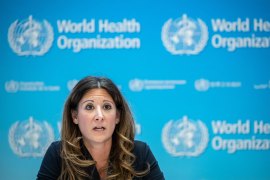Eastern Europe’s HIV Infection Rate ‘Skyrocketing,’ Most New Cases Among Young People, UNICEF Report Says
The rate of HIV infection in many parts of Eastern Europe and the former Soviet Union is "skyrocketing," and almost 80% of all new infections occur in people under the age of 29, according to a UNICEF report released yesterday, the AP/Milwaukee Journal Sentinel reports (AP/Milwaukee Journal Sentinel, 9/19). The report, titled "The Social Monitor 2002" and produced by the UNICEF Innocenti Research Center in Florence, Italy, tracked the "well-being" of children and young adults in Eastern Europe and "warn[ed]" that HIV -- which is spreading "virtually unchecked" -- is the "greatest threat" to the health of the region's youth. According to the report, HIV is spreading faster in some parts of Eastern Europe than anywhere else in the world (UNICEF release, 9/18). The total number of HIV infections in the region more than doubled from 420,000 in 1998 to one million in 2001 (AP/Milwaukee Journal Sentinel, 9/19). Russia and the Ukraine accounted for 900,000 of the region's one million infections in 2001 (Reuters, 9/18). The increased number of HIV cases in the region is due in large part to an increase in injection drug use, early sexual activity and an increase in the number of sex workers. Injection drug use accounts for the majority of the region's HIV cases, the report says. The report recommends that the region increase HIV/AIDS education, especially in schools and among "at risk" populations, including females and low-income residents. The report also says that "current trends in the spread of HIV do not suggest that the epidemic has reached its peak" in Eastern Europe (AP/Milwaukee Journal Sentinel, 9/19). "The implications for the region's economic growth and social stability -- which are so dependent on its young people -- are alarming," UNICEF Executive Director Carol Bellamy said, adding, "HIV/AIDS has a young face in this region. Young people account for most new infections and their low levels of HIV awareness, combined with increasingly risky behavior, herald a catastrophe. It is clear that the gravity of the situation has been underestimated and that precious time has been lost. Without immediate and radical action, there is little to stop the spread of the disease" (UNICEF release, 9/18).
This is part of the Morning Briefing, a summary of health policy coverage from major news organizations. Sign up for an email subscription.





